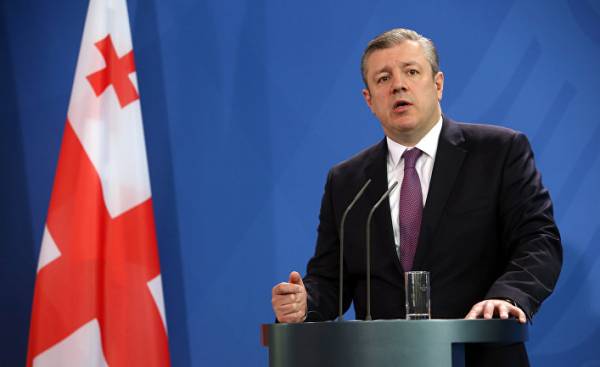
Prime Minister of Georgia Giorgi Kvirikashvili at the end of March at the head of the official delegation with great fanfare, visited Athens and Brussels. Georgian officials said its hard-won victory: the European Union finally fulfilled its promise and introduced a visa regime for the citizens of this Transcaucasian Republic.
But although Georgia became a step closer to the EU, the process of democratization in the country appears to be moving backwards.
The liberalization of the visa regime will facilitate the life of residents of Georgia who wish to explore Europe. It also has a symbolic value, Reaffirming a deepening Georgia’s integration with Europe and showing Georgian citizens tangible benefits from the ongoing reforms in the country. But apart from this symbolic victory, the future democratic development of Georgia is questionable.
The delicate balance that helped Georgia to make progress in achieving its ultimate goal of EU membership, is in danger. In January of this year the United national movement (UNM) — the political force behind the “rose Revolution” in 2003 was divided into two parts. The collapse of the party means that the country is no more opposition forces, able to act as an effective counterweight to the ruling coalition “Georgian dream”. In this regard, observers are asking: “Will the absence of strong opposition parties to obstruct the development of civil society in Georgia?”
The answer starts with “Georgian dream”. In the short term, Bidzina Ivanishvili and other leaders of the ruling party may be tempted to open a bottle of champagne and drink to the collapse END, the only party strong enough to challenge them in Parliament. But they should take a deep breath and think about the possible disadvantages of the situation. It is highly likely that the “Georgian dream” can become overly arrogant and refuse to report to the society about their actions.
This jukebox plays in Georgian politics since the 1990-ies. A new political party comes to power in the Wake of widespread public support and a mandate for the abolition of the illegal actions of the previous government. This party has no opposition, and gradually she begins to act only in their own interests, which leads to its end. To power on the wave of widespread public support comes a new political party with a mandate for the abolition of the illegal actions of the previous ruling party. Then the cycle repeats.
Risks for the democratic system in Georgia intensified by the fact that “Georgian dream” has a constitutional majority in Parliament. In the absence of a powerful opposition able to challenge the actions of the ruling party in the court of public opinion, increases the likelihood that members of the “Georgian dream” will begin to exceed its powers and, thus, violate the existing balance, by amending the Constitution in their own interests, which will cause negative reaction of society.
The first sign of such is that the leaders of the “Georgian dream” has not learned the above history lesson. The party plans to amend the Constitution, according to which the President is elected by members of Parliament and members of municipal councils, not directly by the citizens of the country. It is also about the rejection of the mixed majority-proportional system of elections to Parliament in favor of a fully proportional system. But with a notable caveat: the parties will be prohibited from creating electoral blocs, and any Unallocated places remaining due to the inability of smaller parties to overcome the 5 percent barrier to enter Parliament, it will automatically switch the leading party, which is currently the “Georgian dream”.
These measures will significantly strengthen the power of the current ruling party. They will also become an obstacle to the separation of powers necessary for the further democratic development of the country.
High probability that the “Georgian dream” will begin to exceed its powers. The negative processes can start in the near future. It seems that the Georgian electorate of the ruling party to forgive its many shortcomings because of deep-rooted antipathy to END. But according to public opinion polls before the last parliamentary elections, the approval rating of the “Georgian dream” is at a low level. However, the party won a huge parliamentary majority despite the fact that won only 48 percent of the vote. In this regard, we cannot say that society is in a state of euphoria about the activities of the “Georgian dream”.
A split END can end badly for all parties. The collapse of the party was the latest act in the ongoing process of fragmentation of the political opposition of Georgia, destroying the relative balance between the ruling party and the opposition, supported the democratic development in the last few years. Georgia, as the country continues to strive to strengthen democracy, can not afford a setback. A strong opposition makes the ruling party to remain honest, helping to provide the necessary reforms and strengthen democratic institutions.
As in other democratic countries, the emergence of a strong, institutionalized party system is not a sufficient condition for democratic consolidation, but it is necessary. The purpose of parties is to transform the preferences of voters in the laws. Parties also serve as a means of ensuring accountability of elected officials towards the community. Currently, the opposition party of Georgia is not able to offer a viable alternative to the agenda of the ruling party. This will increase the level of uncertainty in the coming years, especially if the “Georgian dream” will take advantage of its dominant position, which in turn will hinder the democratic development of the country.
However, there is hope that the Georgian democracy will come out of this situation even stronger. The split created the preconditions for the emergence of new opposition forces. As described above the political cycle, Georgian voters are willing to put up with the ruling party for about eight years, which means that the current terms of the “Georgian dream” may be the last. By 2020, the voters will begin to look for a strong unified opposition force that can challenge the current leadership.
But the question of whether there will be by this time a force, remains open.







